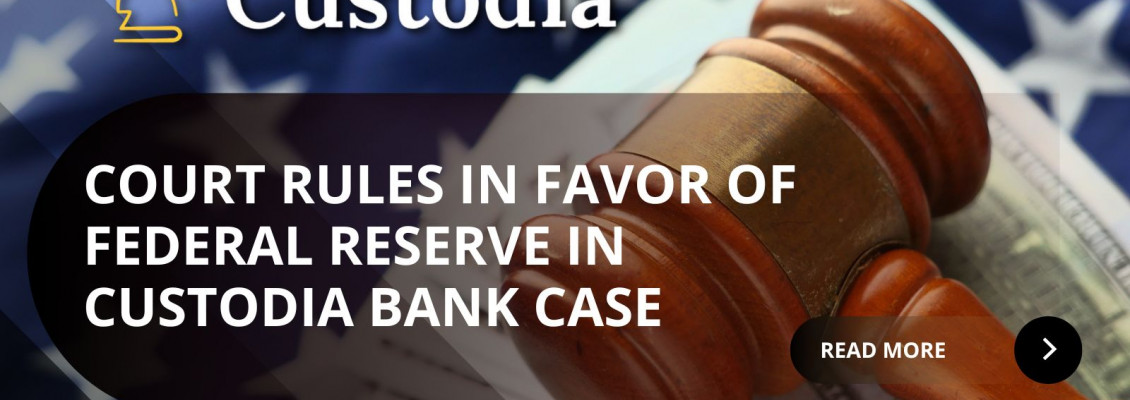
Appeals Court Upholds Ruling Against Custodia Bank in Fed Master Account Case
A U.S. appeals court, the United States Court of Appeals for the Tenth Circuit, has affirmed that Custodia Bank is not automatically entitled to a Federal Reserve master account. The ruling supports an earlier decision from a Wyoming district court, which found that the Federal Reserve has discretion in granting or denying master account privileges.
The case centers on a special-purpose depository institution (SPDI) chartered in Wyoming that focuses on digital assets and crypto services. Custodia applied for a master account in October 2020 with the Federal Reserve Bank of Kansas City and later sued both the Federal Reserve and the Kansas City Fed for what it described as unfair delay and denial of access.
In its judgment, the appeals court agreed that the Fed acted within its legal authority, rejecting Custodia’s claim that it was unlawfully denied access under federal banking laws.
Why It Matters
Access to a master account matters because it allows direct participation in core central bank services such as Fedwire and the Automated Clearing House (ACH). Without it, a bank must rely on a partner institution that already holds an account.
For Custodia and other crypto-friendly institutions, this ruling is significant because it reaffirms that eligibility does not guarantee access. Even if an institution meets charter requirements, the Federal Reserve retains discretion to deny or delay master account access.
For the broader banking and crypto industries, this decision sends a clear message: non-traditional or digital asset banks cannot assume central bank access simply because they hold a state charter. The Federal Reserve’s oversight and standards remain firm.
What’s Behind the Legal Battle
-
Custodia argued that under the Monetary Control Act of 1980, Federal Reserve services are mandatory for eligible depository institutions. The bank claimed that the word “shall” in the law means entitlement to master account services.
-
Regulators and legal experts disagreed, stating that the Federal Reserve Act gives the Fed discretion to assess risks and decide whether to grant access.
-
The court found that Custodia failed to show a legally enforceable right to a master account. It also ruled that Custodia did not properly challenge a “final agency action” under the Administrative Procedure Act (APA).
-
The district court judge warned that removing the Fed’s discretion could lead to a “race to the bottom,” with states offering light regulations to attract new banks looking for automatic access to Federal Reserve services.
What’s Next for Custodia and the Industry
Custodia may still seek further review, but this ruling narrows the path forward. The company can request a rehearing or appeal to the Supreme Court, though both options face long odds.
For the crypto banking industry, the message is clear: meeting state charter requirements is necessary but not enough. Institutions must also demonstrate strong risk management, compliance, and operational standards that meet Federal Reserve expectations.
Regulators and the financial sector will likely use this case as a precedent to define clearer guidelines for digital asset banks. Risk management, anti-money-laundering measures, and transparent governance will remain top priorities before granting master account access.
This case also signals that the Federal Reserve is cautious about integrating crypto-related banks into traditional financial systems until their risk frameworks align with established banking norms.
Final Thoughts
While the ruling is a setback for Custodia, it reinforces an important principle: access to central bank systems comes with oversight and responsibility. The decision does not shut out crypto banks entirely, but it does raise the bar for entry.
For the broader digital asset sector, this moment highlights the ongoing challenge of bridging innovation with regulation. The focus for crypto banks will now shift from arguing for entitlement to demonstrating readiness — proving that they can meet the same safety, stability, and trust standards that define the U.S. banking system.
In the end, this case is less about denial and more about definition. It sets the boundaries for what a compliant, well-managed crypto bank must look like if it wants a seat at the table in traditional finance.
Stay Connected
You can stay up to date on all News, Events, and Marketing of Rare Network, including Rare Evo: America’s Premier Blockchain Conference, happening July 28th-31st, 2026 at The ARIA Resort & Casino, by following our socials on X, LinkedIn, and YouTube.

Leave a Comment